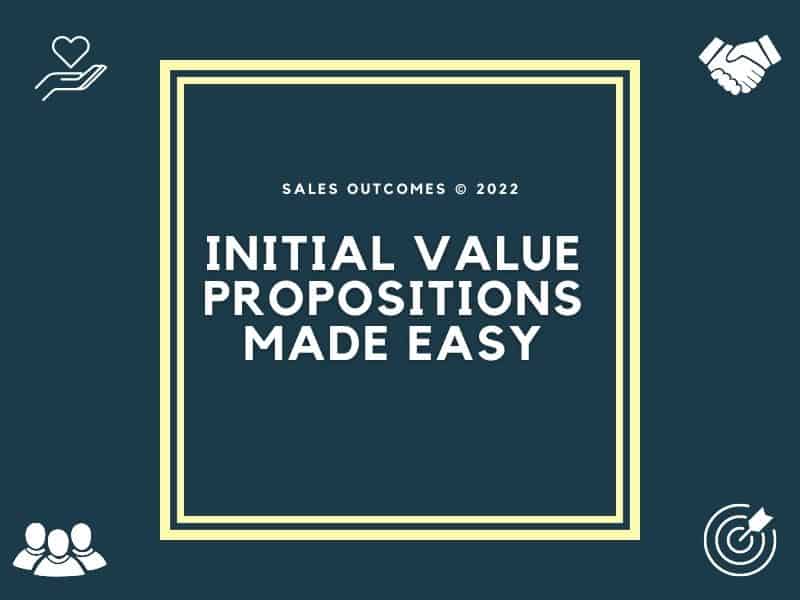Building a business case for change is the essence of B2B selling.
An initial value proposition enables salespeople to effectively communicate the value (business case) of a potential solution in a manner that accelerates the sales cycle.
For example, earlier this year, I presented the following initial value proposition on the first call with a fast-growing software company:
Our support delivers a 5 to 15% increase in sales performance within six months, which we estimate could be $5 – $15 million for your organization.
After introducing the initial value propositions, the Zoom meeting was silent for several minutes. As you can imagine, they had a lot of questions! Questions such as; “How would you do that? How did you calculate that? How can you make that statement as you barely know our company?”
I answered: “Based on the business impact we have delivered to companies similar to yours, this is our conservative estimate of the impact we can have on your company. However, the most important thing about our value proposition is that it is wrong.”
I explained that once we began to work together, we would validate and fine-tune the business impact. I didn’t pull the value proposition numbers from thin air. I researched and leveraged experience, so the numbers I presented were comfortably achievable. We got the deal to work with this company thanks to the conversation prompted by the initial value proposition.
When presenting an initial value proposition, it does not need to be precise, but it must be bold and backed up by past client success and experience.
Salespeople might be reluctant to present an initial value proposition without finance or sales leader approval. However, initial value propositions are not formal proposals. Instead, it’s a conversation starter that you must be prepared to discuss and defend.
Framework of Five Attributes for Initial Sales Value Propositions
Framework of Five Attributes for Initial Sales Value Propositions
Building a business case for change is the essence of B2B selling.
An initial value proposition enables salespeople to effectively communicate the value (business case) of a potential solution in a manner that accelerates the sales cycle.
For example, earlier this year, I presented the following initial value proposition on the first call with a fast-growing software company:
Our support delivers a 5 to 15% increase in sales performance within six months, which we estimate could be $5 – $15 million for your organization.
After introducing the initial value propositions, the Zoom meeting was silent for several minutes. As you can imagine, they had a lot of questions! Questions such as; “How would you do that? How did you calculate that? How can you make that statement as you barely know our company?”
I answered: “Based on the business impact we have delivered to companies similar to yours, this is our conservative estimate of the impact we can have on your company. However, the most important thing about our value proposition is that it is wrong.”
I explained that once we began to work together, we would validate and fine-tune the business impact. I didn’t pull the value proposition numbers from thin air. I researched and leveraged experience, so the numbers I presented were comfortably achievable. We got the deal to work with this company thanks to the conversation prompted by the initial value proposition.
When presenting an initial value proposition, it does not need to be precise, but it must be bold and backed up by past client success and experience.
Salespeople might be reluctant to present an initial value proposition without finance or sales leader approval. However, initial value propositions are not formal proposals. Instead, it’s a conversation starter that you must be prepared to discuss and defend.
Here is a framework of five attributes for initial sales value propositions to attract the attention of potential prospects and accelerate the momentum of the buying process:
1. Clear and Concise
The initial sales value proposition must be concise, and the business impact of your solution has to be immediately apparent to the customer. You will instantly earn their time and attention if the problem/opportunity your solution purports to solve is evident and essential to the buyer. Avoid using technical language, acronyms, or new-age words.
2. Obvious
Explaining how your solution can create a business impact is the “aha” moment when the prospect can imagine the general value derived.
3. Adaptable
The initial solution value proposition must assume that existing processes will need to change. However, the potential prospect must be satisfied that buying and implementing your solution won’t disrupt the entire company.
4. Scalable
An initial sales value proposition should address the scalability of future customer needs. ‘Will this still support my needs in 2-3 years?’ or ‘Can this investment help me grow faster than I currently forecast?’
5. Justifiable
The initial value proposition needs to amplify the value and ROI provided by your solution – For example: “Our customers average a 15% increase in sales growth.”
Lastly, you can combine multiple items above into an initial sales value proposition. For example: “Our clients on average experience a 10% increase in sales revenue within the first six months and a 15% increase over the first three years of our involvement.”
An Initial Value Proposition is a powerful tool to engage leadership teams during the first meeting.
You must be exceptionally well prepared to defend your proposition and demonstrate confidence in your ability to deliver.





